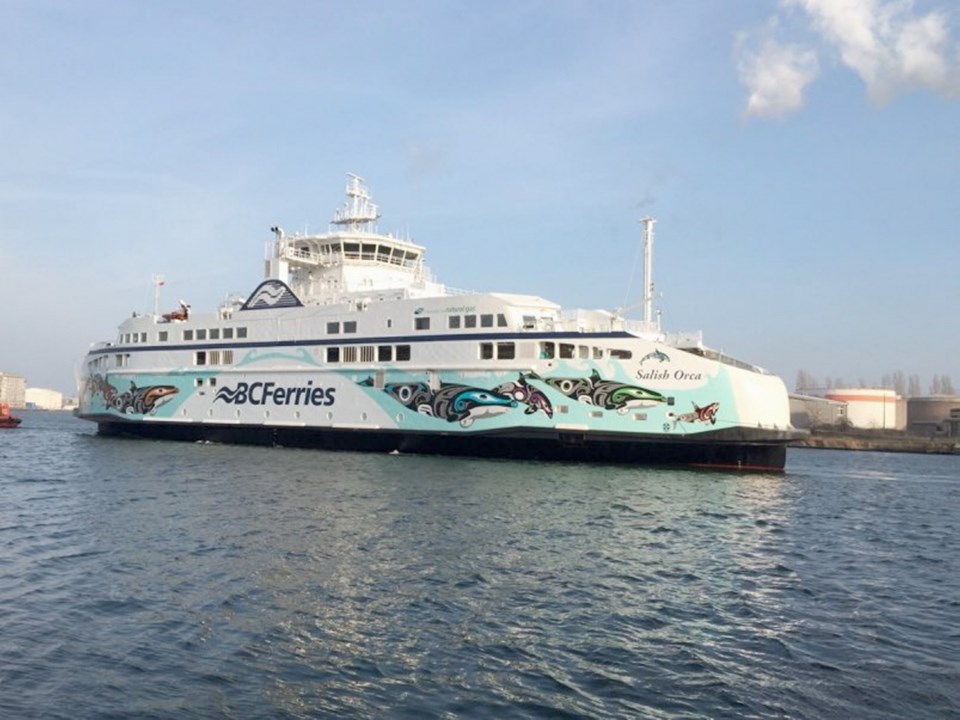B.C. Ferries is aiming to have four new Island-class vessels and one new Salish-class vessel delivered in 2020 and 2021.
The company issued requests for expression of interest on Thursday to build the ferries, which will replace the 53-year-old, Victoria-built Bowen Queen, Mayne Queen and Powell River Queen, all ready for retirement.
Mark Wilson, B.C. Ferries’ vice-president of strategy and community engagement, would not be specific about expected costs because this is a competitive process, but did say the program represented “hundreds of millions of dollars in construction costs for these five vessels.”
The new ferries will add additional service on some routes, and make any change of ferries more seamless. B.C. Ferries is reducing the number of classes to five from 17 to create more efficiencies in the system.
One of the retiring ferries will be replaced by two new smaller vessels on the Nanaimo Harbour-Gabriola Island run and the Campbell River-Quadra Island route. This will be increase passenger capacity per hour to 900 from 400. The number of vehicles will rise to 94 from 60 per hour.
Details are still being finalized, but the new Salish-class ferry will join the older ones on the southern Gulf Islands route, Wilson said.
The closing date for both expressions of interest is Aug. 9. B.C. Ferries will draw up a short list and then issue a request for proposals.
One contract will cover all four 266-foot-long Island-class ferries, which will have room for 450 passengers and 47 vehicles. They will be run under electric hybrid propulsion using batteries. Two other Island-class ferries are now under contract with Damen Shipyards and will be built in Romania. That project’s cost is $86.5 million.
B.C. Ferries wants the first two delivered in 2020 and the others in 2021.
The other job is for a 351-foot-long Salish-class ship with a capacity for 600 passengers and 138 vehicles. B.C. has already received three Salish-class ships from Poland in a $200-million project. Of that, about 85 per cent went on construction, Wilson said.
The new Salish-class ship is to be delivered in 2021 and will be fuelled by liquefied natural gas.
“These new clean-tech vessels will reduce our carbon emission, help the province achieve its greenhouse gas reduction targets, and have the added benefit of reducing the amount of underwater radiated noise we produce,” Wilson said.
B.C. Ferries is a leader in using new technology, he said. “These new vessels will help us move toward our ambition to be leaders in the transition to a lower-carbon future, and our standardization and interoperability of the fleet.”
B.C. Ferries ran a public contest to name the Salish class vessels. It has names in reserve for the next one and will again turn to First Nation artists to design the artwork for the vessel.
Any yard can view for the construction jobs. Both B.C. Ferries and Premier John Horgan have said they would like to see ferries built in B.C.
Alex Rueben, executive director of the Association of B.C. Marine Industries, said he thinks the timing and the size of the upcoming work means it is unlikely to attract B.C. shipyards. A proponent of local construction, he thinks a job in the future for one vessel alone might be something a local yard could handle.
Yards need capital investment to take on new ship construction, he said. Seaspan, for example, spent close to $200 million on facility upgrading to build non-combat ships for the federal government. Workers also need training to build new vessels.
Rueben suggested senior government could offer some kind of incentive to companies to upgrade. An Aug. 1 meeting has been set between the Association and a senior official in B.C.’s Ministry of Transportation to discuss the potential for local ship construction.



